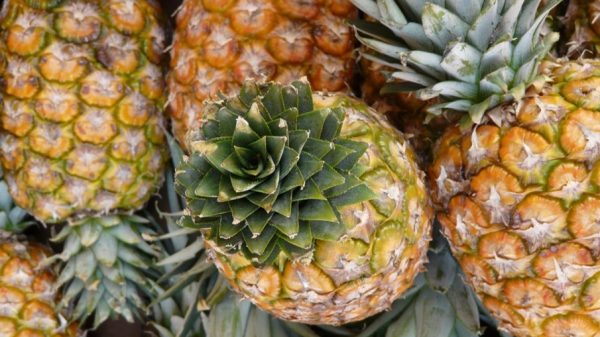
Sweet And Golden Pineapple From Meghalaya
Pineapple from Meghalaya region of northeastern state of Meghalaya, India in recent years has gained more popularity not just in India, also in international market. Meghalaya (abode of cloud in Sanskrit) is known for its lush greenery and favorable climate, which makes it suitable for cultivating a variety of fruits including pineapples. In recent years Meghalaya Organic Mission Agency (MOMA) has reported the successful run of pineapple export of pineapple and airlifting of fresh organic pineapples grown in different parts of Meghalaya. There are wild varieties of pineapple grows in hilly slopes and everywhere in Meghalaya!
The cultivation of pineapples not only provides livelihoods for many farmers in Meghalaya but also contributes to the economy of the region. Pineapple cultivation is often practiced by small-scale farmers in Meghalaya, and efforts have been made to promote and improve the production and marketing of Meghalaya pineapples to enhance the income of these farmers.
In recent years, there have been initiatives to promote Meghalaya pineapples beyond regional markets, aiming to reach broader national and international markets, capitalizing on their unique taste and quality.
Do you know? Meghalaya is also India’s biggest exporter of Meghalaya roses. It is also known for significant production of horticultural crops like orange, guava, litchi, banana, jackfruit, plum, peach and pear. India is ranking in fifth in world when comes to production of pineapple and the credit goes to Meghalaya.
Meghalaya pineapple is celebrated for its sweetness, aroma, and distinctive flavor. The pineapples grown in Meghalaya are often prized for their quality and are sought after in local markets as well as in international markets, especially in Middle East Region including Abu Dhabi. The pineapple variety found here are of the Kew variety. It is a late maturing pineapple variety and is the leading commercial variety in India. It is valued particularly for its canning quality. This variety of pineapple weighs 2-3kg, and is oblong in shape, slightly tapering towards the crown. In addition, these Pineapples have eyes that are broad and shallow making fruits more suitable for canning purposes. The fruit is yellow when fully ripe and flesh is light yellow, almost fibreless, and very juicy with 0.6-1.2% acid. Another variety is known as Queen variety.
Meghalaya pineapples, particularly those from the state’s Ri-Bhoi district, have gained fame and recognition for several reasons. The district of Ri-Bhoi contributes to 38 per cent of the pineapple production of Meghalaya.
Distinctive taste and flavor: Meghalaya pineapples are renowned for their exceptional taste, sweetness, and aroma. The unique soil composition, climate, and cultivation practices in Meghalaya contribute to the development of pineapples with distinct flavor profiles that set them apart from those grown in other regions.
Superior quality: Pineapples cultivated in Meghalaya are known for their high quality. Farmers in Meghalaya often employ traditional and sustainable farming methods, resulting in fruit that is fresh, juicy, and flavorful. Additionally, strict quality control measures are often implemented to maintain the premium quality of Meghalaya pineapples. As per the Agricultural reports – “The Meghalayan pineapples have exceptionally low pesticide and heavy metal residue compared to pineapples from mainland India. Also, regarding taste, they are less sour and significantly sweeter. The pineapples have a Brix value of 16-18, which indicates the sweetness of the fruit. The State of Meghalaya has pineapples as the One District One Product for the districts of Ri Bhoi and East Garo Hills.”
Organic cultivation practices: Many pineapple farmers in Meghalaya practice organic farming methods, avoiding the use of synthetic chemicals and pesticides. This results in pineapples that are fresh, healthy, and free from harmful residues, appealing to health-conscious consumers.
Geographical indication (GI) Tag: Meghalaya pineapples have obtained a Geographical Indication (GI) tag, which certifies their origin and unique characteristics associated with the geographical region of Meghalaya. This recognition adds value to Meghalaya pineapples and helps protect them from imitation or misuse of the name.
Cultural significance: Pineapples are not only a significant agricultural product but also hold cultural importance in Meghalaya. They are often used in local cuisine, festivals, and traditional rituals and the fruit symbolizes hospitality and is offered as a gesture of welcome and goodwill, further enhancing its significance within the community.
Economic impact: Pineapple cultivation plays a crucial role in the economy of Meghalaya, providing livelihoods for many farmers and contributing to the state’s agricultural output. The fame of Meghalaya pineapples has led to increased demand, both locally and internationally, thereby boosting the income of farmers and stimulating economic growth in the region.
Health benefits: Like all pineapples, Meghalaya pineapples are rich in vitamins, minerals, and antioxidants, making them not only delicious but also nutritious. This health-conscious aspect adds to their popularity among consumers who seek natural and wholesome food options.
The fame of Meghalaya pineapples stems from their exceptional taste, superior quality, cultural significance, and positive economic impact, making them a prized agricultural product both within India and on the international stage.
References:
https://www.ishs.org/ishs-article/902_30
Image credit: https://pxhere.com/en/photo/1156667 (CC 0 Public domain)
Author: Sumana Rao | Posted on: January 30, 2024
« Role of Women in Farming in India Sustainable Energy Initiatives In India And The World »






















Write a comment